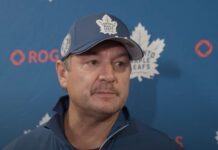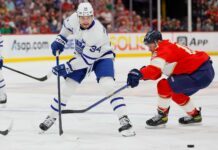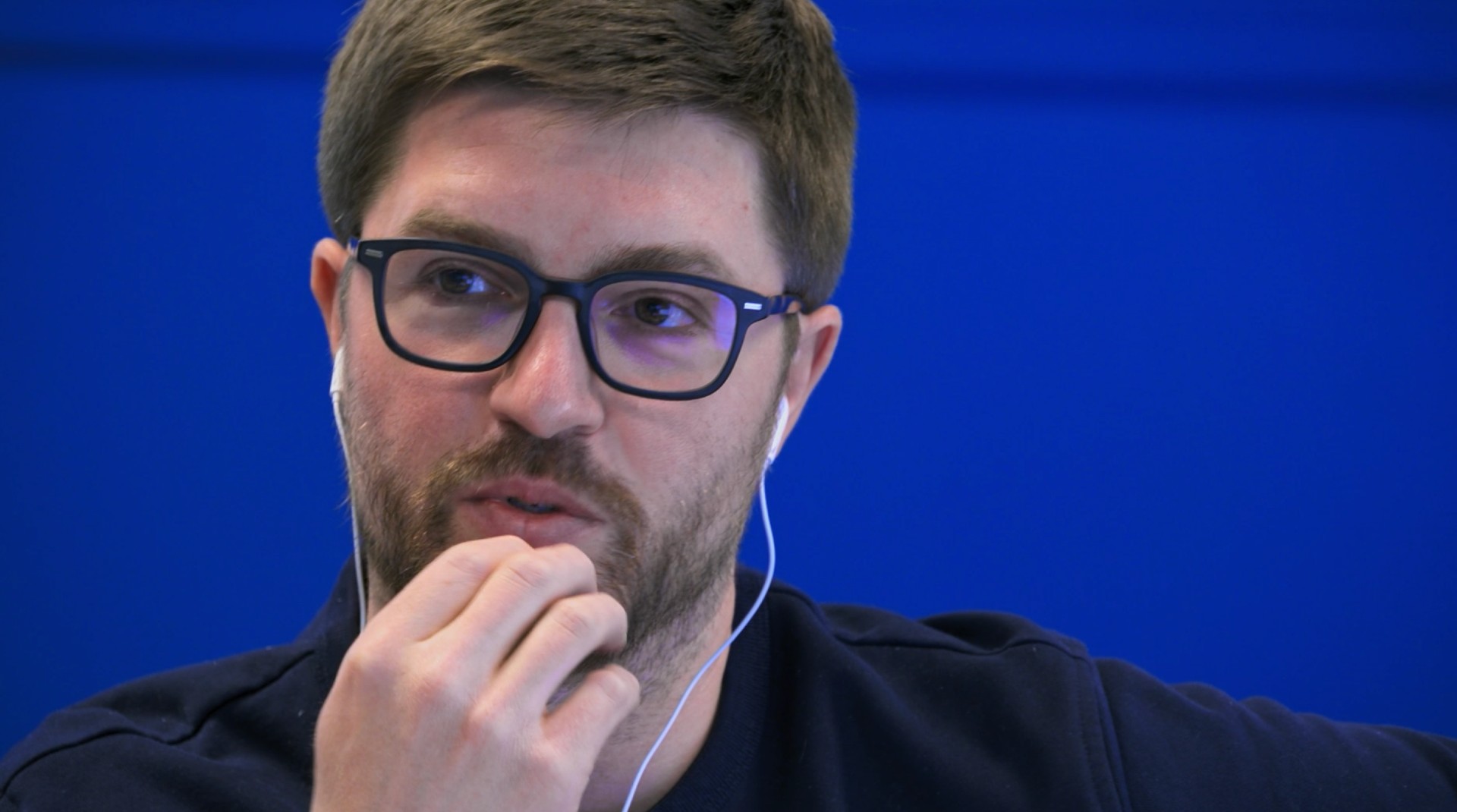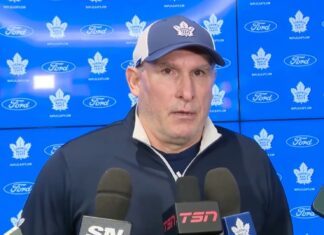At the end-of-year press conference, Maple Leafs GM Kyle Dubas discussed another disappointing first-round exit for his team, Auston Matthews’ next contract, the team’s prospect pool, his continued faith in his roster construction around his four core forwards, and much more.
Opening Statement
Dubas: Obviously, we are here today at a point where we are proud of the progress that was made during the year. However, we weren’t able to take the key step and the most important step at this time of the year.
Beginning essentially Saturday night at the final buzzer, you begin to get ready to get to work and get to the offseason right away to ensure that we aren’t in this position again as we move forward. We are doing everything we can to surround our coaching staff, players, and support staff with everything that they need to continue to push and break through.
That will be my job and our management team’s job during the offseason. The regular season gives me great hope for the team. The way that we competed in that series against Tampa gives me further belief in the team. However, we need to take those next steps.
That is what all our intention and effort will be put into. That started on Saturday night at 10:05 p.m.
Q&A
Do you come back with the same core? Do you keep knocking on the door? Do you anticipate more changes than just some of the things you did last year?
Dubas: The way we approach the offseason is the way that we always have. I don’t view it as just the “core four.” I never refer to the team in those exact terms. I look at the core group as a whole and try to determine what is the best way to move ahead with trying to accomplish our goal and reach our potential. If there is a way that we can improve the team and become a better team, we will do that.
I don’t think that we just want to start making changes that may be lateral or make us inferior as a team just to say that we changed something. In these moments, it is easy to say that you believe at the beginning of the year. It is easy to say that you believe when you won or that you always have. In these moments where you have not reached the potential that everyone knows you have and you internally know that you have, that is when true belief is measured.
I do believe in the group. That said, with every offseason, no matter what the end result was, we would look at the entire group. We will do that in the coming weeks and determine how we want to move ahead.
This series loss, as hard-fought and competitive as it was, does not take place in a vacuum, whether we look at the six years of losing out in the first round, 18 years since winning a series, or back to 1967. How do you balance knowing you are close but also knowing the group couldn’t push it over the line?
Dubas: I don’t think this group carries the burden of 18 or 55 years. We are concentrated on the group that we have. A lot of them have accrued some experience and fallen a little short from time to time.
I think the playoff series and the way that the team played was different. I didn’t feel in Games 5 or 6 or 7 that we were on our heels or reacting to another team dictating to us the way that the game was going to go. In Game 5, we battled back. In Game 6, we battled back. In Game 7, I didn’t feel like I did in the previous years where we were passive and had to play catchup down two or three goals in the game.
The guys came out and played hard. It was likely the best opponent we faced in that time. Now, more than ever, it is looking at it that way. The easy thing to do would be to make bold statements or bold changes, but it is continuing to maintain that belief at this time that is vitally important.
In previous exits, you had various things break against you — a Tavares injury, a Kadri suspension, and so on. This year, it was completely different. You were healthy. What would be different next year? Why is the belief in the group there if a completely healthy lineup couldn’t get it done this year?
Dubas: It is a fair question. The team continues to grow. It is hard to sit up here and say because the end result was a loss in Game 7 in the first round, but the way that the team played in the regular season and the way that we played in the series was much different than those previous years, as I previously outlined.
Just going through these exit meetings and speaking with Sheldon right after and the playoffs right after, they know that we are close. They also know that the closest part and the closing part is the hardest part.
They seem fully accepting and ready to embrace that more so than the other groups where there was more excuse-making or looking for answers. They know what the answer is. It is within. It is still a young group. If you look at the Austons, Mitchs, and Williams, they are going to continue to get better and improve.
The other part of it is that it falls on me. It falls on me to continue to find the right pieces to go around the group to push us ahead, continue to adapt my approach, work with our management team, adapt our approach, and find the right pieces that can continue to move us ahead.
I know the coaching staff and players are going to do their part. I am going to do my part. We have already gotten to work on the last few days. We will get to work on it in the coming weeks and months.
You find yourself in a position with a number of RFAs and UFAs and not much cap space to work with. How do you navigate improving on a roster with so little flexibility?
Dubas: The positive is that we have gotten used to that. Last season, we were faced with a very similar exercise and a similar question of how we were going to improve when we had certain RFAs or UFAs coming up; some are due raises, some you are not going to be able to afford.
I think the answer is that we need to replicate, in most regards, the way that we operated last summer by going out and being able to find players who can come in, add to our group, and do so at not a very high cost but by taking advantage of the opportunity and flourishing.
That falls onto me and our player personnel department more than anybody else to go out and find those players again. It is a challenge. In the current environment, for most teams that are contending, I looked at one point this year and we had 17 or 18 teams at or over the cap with LTI. With the pandemic and the effects that its had on the game, it is always going to make it challenging.
It is a challenge that we embraced last summer, especially coming off of the series we had last year and the disappointment we had then. We need to replicate that again but also eliminate any mistakes at all. The margin for error is so much smaller.
It is a challenge — one that we embrace and one that, in the future, we will be judged on.
With the salary-cap crunch, do you need more from your Marlies and guys coming up on ELCs next year?
Dubas: Yes, I do, and I expect that we will. It is not only the players that are the obvious ones that are higher picks, but if you look at the bottom of our forward lineup in particular… There are guys who may not have as high a profile but can play specific roles and provide specific elements, whether it is speed, physicality, power, or presence. A Bobby McMann, Curtis Douglas, Joey Anderson — players in that mold — in addition to the Robertsons and the like. That is where the focus will be for sure.
I met with those players yesterday. What their opportunity is going to be in training camp was made abundantly clear in terms of what they are competing for. We do need those players to begin converting from being good prospects and Marlies to being good players for the Leafs, yes.
What do you think of the state of the organization’s prospect pool? Can you update us on the situation with Rodion Amirov, and whether you think Roni Hirvonen and Topi Niemela will be playing in North America next year?
Dubas: In the last several drafts, we have really added to the depth of the pool. We haven’t picked particularly high. The one time we did have a high pick — I will answer that subsequently with Rodion and the unfortunate situation there. But we feel as though these prospects are starting to push.
At the end of the year with the Marlies, Pontus Holmberg came over. He was a sixth-round pick in 2018. He played exceptionally well for them. We feel he will challenge for the roster next year. He has played on the Olympic team and won a championship in Sweden.
We have Robertson, who has been up and down. We felt he played his best hockey at the end of the year. And you mentioned Niemela and Hirvonen. We feel the depth is there. We added Matthew Knies, Ty Voit, and the goaltender Vyacheslav Peksa last year. All of them had exceptional seasons.
I am very happy with where the amateur scouting staff has taken things despite not having a lot of picks in two of the three drafts, really. As I told the players yesterday that are in that mold of Marlies or below, we need them to grow together and come together quickly and expedite things with their development in order for them to help our group. That is going to be the best way we do it.
With regards to Rodion, he is now back in Ufa after his first round of treatment in Germany. He will go back to Germany in a month or so for his second round of treatment. We just cross our fingers with lots of hope and thought with him. It has obviously been a very difficult situation.
You draft a player, you meet them, and a month later, they are the top forward at the Karjala Cup. Everything is going great. He comes over here and has a great session here last year in the spring. Essentially, upon going back, the issues crop up which eventually led to the diagnosis, which was the worst thing that you want to hear, especially when you are talking about a 18 or 19-year-old athlete with so much potential who had shown that potential since the draft even more so.
It is difficult. We will continue to support him. I am stunned by how positively he has handled the entire situation. It is really remarkable, for someone being dealt that, how positive and optimistic he has remained. It is quite inspiring. That has been great to see.
Finally, with Hirvonen and Niemela, because of their transfer agreements, both have to be offered back to their respective teams in Karpat and Helsinki. That will be the situation there unless they make the NHL roster.
Have you reconsidered the portion of cap you are spending on high-end forwards versus what you are spending on bottom six, defense, and goaltending?
Dubas: I think we always consider everything at the end of every season and during every season essentially every day. All of that said, I think the contracts to those players that you are referencing are providing us with great value in the way that they are producing and the way that they continue to evolve as they go through their contracts.
I don’t regret those at all. I just think it is the reality of the league right now. You are probably not going to be able to spend as much as you want on those depth pieces. You are really going to have to do a great job of finding value, whether that is someone that is coming off of injury, someone who hasn’t been given great opportunities, or someone coming off of a bad year that you think you see something in and is a fit with your team.
Whether that is next year’s edition of Bunting or Kampf or Kase, whatever different reason they are going to be a good fit, that is where we have to focus. I don’t know if I ever felt that it is best to detract from some of your very best players to spread the dollars around on players who aren’t as good.
The second line was a work in progress, and John Tavares was used with a lot of different linemates this season — which isn’t necessarily a bad thing, and Sheldon Keefe lauded his flexibility this season. But there was always an understanding that the latter two or three years of his contract could look a little bit different. In saying that, what can you do to help maximize the remaining three years on the deal for Tavares and maybe beyond that?
Dubas: I view my job, whether it is John or anybody else, to be giving Sheldon and the players the pieces around them that are going to allow their primes to be extended as long as possible. I have never gone into any long-term deal and felt that the back-half may be a challenge, or that the player will need to adapt.
As players age, we have the resources here to be able to help them as much as possible in every regard on and off the ice. We need to continue to do that.
In regards to roster construction, players are going to change as they age inevitably. As a management team, we need to support them with pieces that are going to best allow them to maintain their primes as long as possible.
Whether it is John or anybody else on our team that you view as over… Whatever people view the prime as — some say it is 24, some say it is 27, and some would say it is 30. Whatever it is, we want people who can come in and maintain that level as long as possible. That falls on us.
Are you open-minded to thinking of a different roster construction now with the core four?
Dubas: I think I will just reiterate my previous answer on it. I don’t view it just as a four. I view the core of the group as much larger than that. It is my job at the end of every year to evaluate if we can improve the team. If there is a way to improve the team which involves someone who me, you, or anyone would constitute as core, it is my job to investigate that and determine if it will make us a better team in the short or long run and whether we want to do that.
Different may gain some applause and some accolades because it is different, but if it is not better, we are going to have a better chance of sitting here disappointed again. Everything that we do will be geared towards improving the group. We will look at everything possible to do that.
If Jason Spezza wants to come back, will there be a spot for him?
Dubas: That will be a conversation that I’ll have with Jason here in the coming days and weeks. We will report back.
If Jason decides he doesn’t want to play anymore, is there an interest in bringing him back in an off-ice role?
Dubas: I have never had a player in that position before. It would be my first experience really going through that. I guess we had Ron Hainsey a few years ago. When he retired, he wasn’t with us, but he did a little bit with us and went to the PA. It would be uncharted territory for me.
I will talk with Jason today. It is hard, sitting here, to fully describe the impact that he has had on the team positively. Obviously, there are his contributions to the roster, but in the locker room, in the summer, the time he puts in with every single younger player from the players he has arrived — he is a special person.
There would probably be 31 teams other than us that would have an interest in having him a part of it in some way. I just don’t know where his head will be at with everything: playing, not playing, working, family. We will sort through that first and go from there.
To what degree are all of these first-round failures putting a strain on the close relationship between yourself and Sheldon Keefe?
Dubas: We have worked together at three different levels and three different teams. We have won once together. In other seasons, we have lost in Conference Finals, second rounds, and first rounds. I think the great value in my relationship with him is that we can be very confrontational and challenging of one another.
I have always thought this is the key, in my experience. In the GM and the coach’s relationship, can you argue? Can you challenge one another? Can you call each other out when you think you are below the standard you expect from one another, and not have it cause any long-term issues in the relationship — and more than that, come back the next day knowing you are stronger and are working towards the same goal?
I think that is always the way it has been with Sheldon. That is why I value that relationship with him as much as I do.
In the past few days, we have seen both Barry Trotz and Peter DeBoer come available. Both of them are either Stanley Cup winners or finalists who have had successful playoff runs. Do you as a GM sit back, look, and say, “Those guys might make my team better?”
Dubas: It hasn’t necessarily crossed my mind at this point. My reason for that is my belief in Sheldon and the job he has done here so far but also that I only think that Sheldon is going to continue to get better. When we speak of Sheldon in 10 or 15 years now, it will be in the same way that you just spoke of those two great coaches. That’ll be played out here in Toronto.
There appears to be a doomsday clock as it pertains to Auston Matthews and a contract that is going to be coming up in 2024. How concerned are you that you are now down to a two-year window to not only win a round but win the whole thing?
Dubas: I certainly do not view it as a doomsday clock. We are fortunate to have one of the best players in hockey under contract for two more years. Beyond that, he is a great player that we would like to see play his whole career with Toronto. He wants to win more than anybody. He is on board with that in every discussion we have with him.
That is our focus: to build the best team possible to take advantage of having players of that calibre.
In order to re-sign him, do you not have to show him the team can win?
Dubas: That is a question for Auston more than it is for me in terms of what he and his representatives are looking for in a team. In my conversations with him, he believes we are close. He has said that to everybody here. He is going to be a big part of helping us get here as he continues to grow and evolve.
You have a long relationship with Jack Campbell. Is it a priority to get him back under contract for next season and beyond?
Dubas: I do have a long relationship with him. I think I would put Jack in the same grouping in terms of him, Ilya Mikheyev, Mark Giordano, Ondrej Kase, and Ilya Lybushkin that are unrestricted free agents. We will sit down as a group here in the coming days and weeks. Brandon Pridham will get to work in speaking to their representatives and get an idea of what the expectations are. We will begin to look at the marketplace and then make our decisions from there.
What did you learn about Jack Campbell this season?
Dubas: It has been a great story. Certainly, he came over in 2020 and was sort of splitting the backup role or was getting ready to with Cal Petersen. He came here, was excellent for us in that stretch, and last year, he became the starter midway through the year when Fred got injured. He played well against Montreal. This year, he had the great start.
The thing I learned most about him this year was not the great start and becoming an All-Star. Maybe it wasn’t learning but reaffirming something that I had always known about Jack Campbell, which is that when it doesn’t go well and things are hard, I find you learn so much about people in those instances. As an athlete, especially at the highest level of athletics, can you find a way to get them back on track?
Right after the All-Star break there, he had the lull in his performance. He had the injury after the game in Columbus, and he came back from that after working with Steve and the coaching staff. He was great down the stretch and played very well for us in the playoffs.
I guess it reaffirms things you know about Jack Campbell and his ability to start the year great, deal with a stretch of poor form, find his way back, stabilize himself, and be ready for when the team needs him.

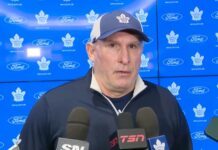
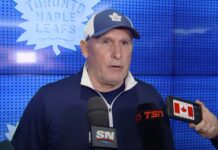
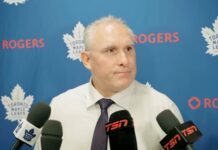


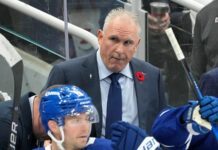
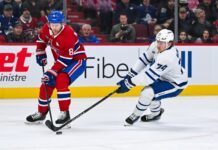

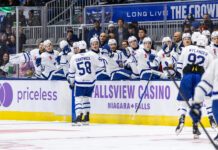
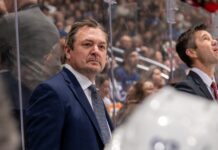
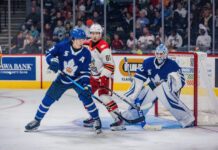
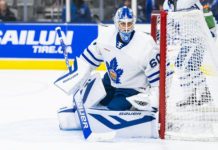

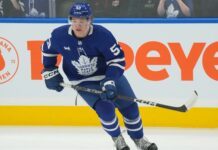
![John Gruden after the Leafs prospects’ 4-1 win over Montreal: “[Vyacheslav Peksa] looked really comfortable in the net… We wouldn’t have won without him” John Gruden, head coach of the Toronto Marlies](https://mapleleafshotstove.com/wp-content/uploads/2025/09/gruden-post-game-sep-14-218x150.jpg)

